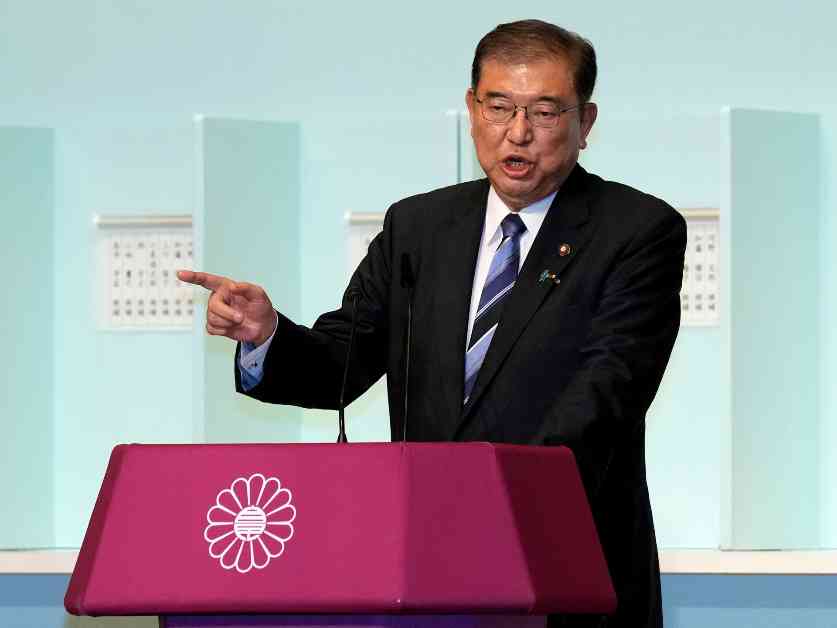Shigeru Ishiba Emerges Victorious in Leadership Election
Shigeru Ishiba, the former defence minister of Japan, has secured a significant victory in the leadership election of the country’s ruling Liberal Democratic Party (LDP). With the LDP holding a majority in parliament, Ishiba is now poised to become Japan’s next prime minister.
The 67-year-old veteran politician triumphed in a closely contested race on Friday, ultimately defeating Economic Security Minister Sanae Takaichi in a run-off after none of the initial nine candidates managed to secure a majority in the first round of voting. The final tally stood at 215-194 in favor of Ishiba.
Having made five attempts at securing the top leadership position within the LDP, Ishiba’s persistence and experience were key factors in his victory. Al Jazeera’s Rob McBride described him as a longstanding LDP veteran, highlighting his long-standing dedication to the party and his unwavering commitment to public service.
Historic Potential for Japan’s First Female Prime Minister
Although Ishiba emerged as the winner of the leadership election, it is worth noting that Sanae Takaichi could have made history as Japan’s first female prime minister if she had been successful in her bid for leadership. Takaichi, a prominent right-wing and hawkish figure within the LDP, garnered significant support but ultimately fell short in the final round of voting.
Rob McBride remarked on the significance of Takaichi potentially becoming Japan’s first woman prime minister, underscoring the strides being made towards gender equality and representation in the country’s political landscape.
A Shift in Leadership Amidst Scandals and Public Discontent
The leadership election comes on the heels of Prime Minister Fumio Kishida’s decision to resign in August following a series of corruption scandals that plagued the LDP. With the party’s majority in parliament ensuring that the victor of the leadership race will be formally elected as the 65th prime minister on October 1, the stakes were high for all candidates involved.
Ishiba’s popularity among the public, coupled with his reputation for integrity and fairness, positioned him as a frontrunner in the race. As Yu Uchiyama, a University of Tokyo politics professor, noted, Ishiba’s emphasis on transparency and accountability resonated with voters at a time when scandals had eroded public trust in the party.
In his remarks to lawmakers before the run-off, Ishiba emphasized the need for a fairer and kinder Japan, striking a chord with many who were looking for a leader who prioritized inclusivity and compassion in governance. Tears welled in his eyes as the final results were announced, underscoring the emotional weight of the moment for Ishiba and his supporters.
Policy Priorities and Challenges Ahead
Ishiba’s campaign centered on a range of policy priorities, including national security, economic reform, and rural revitalization. With a focus on enhancing oversight of US military bases in Japan and advocating for the creation of an “Asian NATO,” Ishiba’s vision for Japan’s role in the region is characterized by a commitment to regional stability and security.
On the economic front, Ishiba has raised concerns about the Bank of Japan’s monetary policies and has called for greater attention to addressing the challenges of rural depopulation. As a former agriculture minister, he brings a unique perspective to the leadership role and is expected to champion policies that support agricultural communities and promote sustainable development.
As Japan’s new prime minister, Ishiba will face a host of pressing challenges, both domestically and internationally. From navigating regional security threats posed by China, Russia, and North Korea to reviving the economy in the post-pandemic era, Ishiba’s leadership will be tested in the months ahead.
In conclusion, Shigeru Ishiba’s victory in the LDP leadership election marks a significant moment in Japan’s political landscape. With his experience, vision, and commitment to serving the public interest, Ishiba is poised to lead Japan into a new era of governance and address the complex challenges facing the country.



























